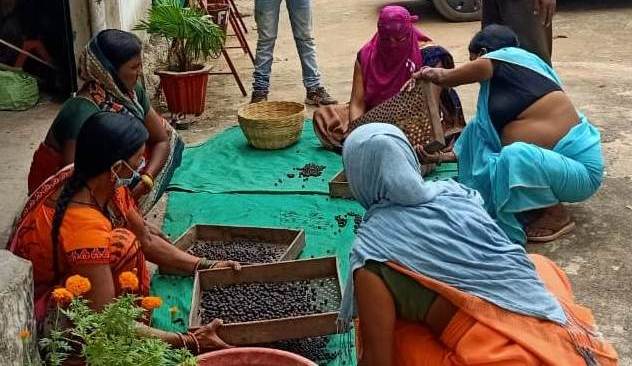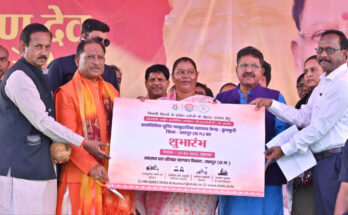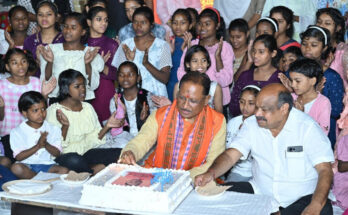Dhamtari 15 January 2021. The papaya of ‘black diamond’ which means ‘Makhana’ with medicinal properties has now started with the machine in Dhamtari district. It is worth noting that dry fruits, makhana used as fasting food, contain abundant calcium, vitamin complex, fiber and ash. It is also very beneficial for diabetes patients, as it contains a very small amount of sugar. It is also beneficial for heart patients. Makhana, which is available in the open market for 600 to 800 rupees kg, is being cultivated in Krishi Vigyan Kendra area in Dhamtari for the last three years. Senior scientist and major agricultural science center Dr. SS Chandravanshi explains that Makhana is cultivated in waterlogged and marshy lands. Since the area of Dhamtari district is lowland, Therefore, the scope of Makhana farming to get better results cannot be denied. It is also interesting to note that Makhana cultivation was first started in Dhamtari district in the state.
Along with this, the cultivation of Makhana has been tested in the fields of the farmers and they were also advised that ‘black diamond’ can be grown easily in such fields where there is more waterlogging. With this understanding and understanding of the medicinal properties of ‘black diamond’, the farmer of Bodra, Shri Hari Om Sahu cultivated Makhana in his 75 Dismil farm in 2017-18. About seven quintals of Makhana seed produced here were sold in Bihar and Ludhiana with the help of Krishi Vigyan Kendra. Farmer Mr. Sahu made a profit of Rs. 40 thousand from this. Though manual makhana popping was done in the district at that time, due to this, raw makhana seeds were sold.
But recently, Makhana Processing Unit has been set up at Krishi Vigyan Kendra Sambalpur under Rurban Cluster Loharsi. In which Makhana roasting and popping machine costing 12 lakhs has been provided. Through this, now the possibility of increasing the trend of farmers towards papery and makhana cultivation has increased. In this Makhana Processing Unit set up at Krishi Vigyan Kendra, 10 women of women self help group of Janharjagaran, Jai Durgay, Gayatri, Jai Maa Parvati etc. of Loharsi Rurban cluster have taken training and are also running this unit.
Mrs. Saraswati Sahu of Jai Durgay Women’s Self Help Group and Mrs. Sarita Sahu of Gayatri Women’s Self Help Group Sambalpur say that her group has been cultivating Makhana on half acre since 2019-20. At that time, manual popping used to take a lot of time due to the availability of the makhana processing machine. Now by popping with this machine, good quality makhanas are being popped and both labor and time are being saved. At the same time, Mrs. Santoshi Ramteke and Mrs. Jayanthi Dhruv were also very happy about the profits made by popping the group with the establishment of Makhana Processing Unit.
It is worth noting that in the year 2019-20 at the Krishi Vigyan Kendra, the production of Makhana seed produced on eight acres is still being done. There is a possibility of producing about 30 to 40 quintals of Makhana seed from the Makhana plant planted in August 2020 till January. Soon after this, Makhana plants can be planted in the field from January to February. Dr. Chandravanshi explains that Makhana crop can be taken twice a year in Kharif and Rabi seasons. Due to the low land, there is a lot of potential here that the trend of farmers in the cultivation of this dry fruit will increase further. Establishment of Makhana Processing Unit will also prove to be helpful in this. He says that earlier, where three to five kilos of Makhana were popped in a day on a manual basis, At the same time, 20 to 30 kilos of Makhana pops are being received from the machine. In this way, the cost of makhana popping is Rs 44 thousand and net profit per acre is Rs one lakh 17 thousand. He also informed that 8 to 9 quintal of Makhana Seed (Ra) is available per acre, which costs 28 thousand rupees and net profit is 53 thousand rupees per acre. This is indeed a good opportunity for the farmers of the district, when they can earn a considerable profit by cultivating black diamonds (Makhana) in marshy and waterlogged fields in both Kharif and Rabi seasons.




